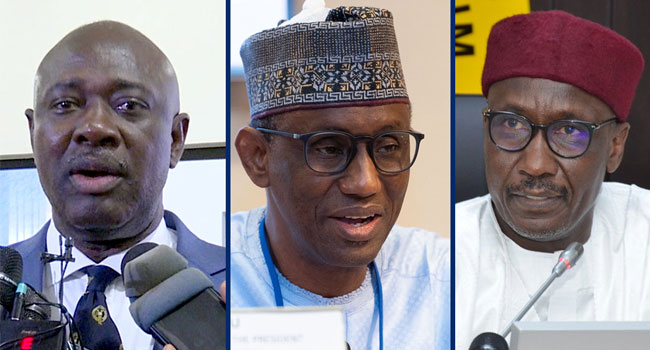Vice President Kashim Shettima has summoned Senator Heineken Lokpobiri, the Minister of State for Petroleum Resources (Oil), along with Mele Kyari, the Group Managing Director of the Nigerian National Petroleum Company Limited (NNPCL), and National Security Adviser Nuhu Ribadu to the Presidential Villa.
The meeting, held at the State House in Abuja on Thursday, is in response to the recent sharp increase in the price of Premium Motor Spirit (PMS), commonly known as petrol.
The NNPCL had raised the pump price of petrol on Tuesday from ₦568 to as high as ₦855 and ₦897 per litre, depending on the location, exacerbating the ongoing fuel scarcity and economic challenges in the country. Private fuel suppliers had already been selling petrol at even higher prices, with some charging ₦1,200 per litre as of Wednesday.
This increase followed an admission by the NNPCL that it was struggling to maintain fuel supplies due to financial constraints. In major cities like Lagos, Abuja, and Kano, some private petrol stations were shut down, while long queues of cars formed at NNPCL stations as people waited overnight to buy fuel.
The price hike has drawn widespread condemnation from various groups and individuals, including the Nigerian Labour Congress (NLC), Trade Union Congress (TUC), Nigerian Bar Association (NBA), and Nigerian Medical Association (NMA). They argue that the increase will only worsen the economic hardship faced by Nigerians.
NLC President Joe Ajaero criticized the government for the move, accusing it of betraying the labour movement and calling for an immediate reversal of the fuel price hike. He also demanded the release of those detained for participating in recent protests and the reversal of other policies, such as the 250% electricity tariff hike, which he claimed were fueling insecurity and poverty in the country.
Despite the public outcry, Presidential aide Bayo Onanuga defended the price hike, stating that it was necessary to keep the NNPCL financially afloat and to ensure the continuation of government services. He pointed to the long-awaited Dangote refinery, Africa’s largest, as a potential relief for the country’s fuel crisis once local petrol production begins.
Nigeria, despite being a major oil producer, relies heavily on fuel imports due to its limited refining capacity, leading to frequent fuel shortages. Since assuming office, President Bola Tinubu has initiated several reforms under his “Renewed Hope” agenda, aimed at stabilizing the economy and attracting investment. These reforms include ending the costly fuel subsidy and liberalizing the naira. While officials urge patience, inflation hit a 30-year high of 34% in June, with food inflation remaining at 39.5%.
To help mitigate the rising cost of living, the government recently more than doubled the minimum wage for public sector workers to ₦70,000 per month. However, by Wednesday, transport and food prices had already begun reflecting the impact of the new fuel price increase.



